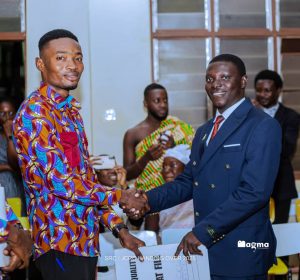
Dr Asangba Reginald Taluah is a senior lecturer in the Department of Interdisciplinary Studies, Faculty of Education and General Studies at the Akenten Appiah-Menka University of Skills Training and Entrepreneurial Development. He holds a PhD in Literary Linguistics.
The courses he teaches and the areas of research include English Education, Stylistics, Literary Studies, Anthropological Linguistics, Cognitive Linguistics, Comparative Literature, Oral Literature and African Studies in general. Quite apart from his role as an academic, Dr Taluah is also a poet. He has performed his poetry on both national and international platforms.
He was awarded a DAAD PhD scholarship to pursue his doctorate in Literary Linguistics at the University of Cologne, Germany between 2017 and 2020, where he graduated with a distinction in his PhD Defense.
The Outstanding Dissertation Award ceremony took place in Leipzig, Germany on the 5th of May 2023. The Outstanding Dissertation Prize was awarded by Fachverband Afrikanistik e.V (German Association of African Linguistics) under the auspices of the Afrikanistik innestag Conference 2023, (4-6 May 2023).
The Fachverband Afrikanistik Outstanding Dissertation Prize for 2020 and 2021 awarded a prize of 500 euros and a certificate of recognition for the best PhD dissertation submitted in Afrikanistik in the past two years. A jury, made up of members from all African Studies institutes in the German-speaking area selected the PhD dissertation by Dr. Asangba Reginald Taluah, titled: Grandmasters of the Drum: A Literary Linguistic Analysis of the Dagbamba Panegyrics as the best PhD dissertation of 2020 and 2021.
The Management and staff of AAMUSTED extend their congratulations to Dr Taluah for this remarkable achievement.


Abstract
Grandmasters of the Drum: A Literary Linguistic Analysis of the Dagbamba Panegyrics.
The ultimate rendition of an oral text is the actual product of the verbal artistic venture. The oral text proper does not exist until it is performed. Prior to its performance, it only exists in snippets, in the creative minds of the praise poets and the contributory actions; either active or passive, of the audience and patrons in particular. The context of performance and other related contexts are imperative. As such, Grandmasters of the Drum: A Literary Linguistics Analysis of the Dagbamba Panegyrics adopts a descriptive analytic approach in qualitative research to examine both the literary and linguistic inventiveness of the Dagbamba praise poets. The diversity of the oral texts warrant the initiation of the contextual relativist approach, which allows for a holistic examination of the texts from diverse perspectives. In any literary linguistic analysis therefore, the aesthetics of the texts contribute significantly to the figurativeness of the respective art form. The general techniques and style of composition employed by the Dagbamba praise poets are edifying in diverse respects. As products of the collective conscience of the Dagbamba, the panegyrics are not memorized by rote but in-situ. The belief in potent charms and consanguine ties, backed by practice have a great toll on the memorization abilities and performance skills of the Dagbamba praise poets. Quite apart from the skillful employment of the Dagbani language; with particular respects to the general syntactic and semantic structures of the texts, the adept interplay of figurative language in a fusion of both historical facts and myths by the Dagbamba praise poets are very captivating. Detailed examinations of the subject matter, themes and motifs that are carried up in the texts demonstrate great literary merits. Figures of speech and prosodies elements such as metaphor, symbolism, imagery, allusion, epithet, rhythm, proverb and general traditional idioms and formulaic expressions that are embedded in the texts reveal the creative ingenuity of the Dagbamba praise poets and their forebearers.



